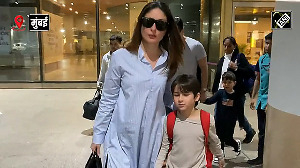'I was more at home in Maheshwar than in Dallas,' says Sally Holkar who left America and made India her home nearly 60 years ago.
She went on a mission to revive a dying craft and changed the lives of rural weavers.

Sally Holkar was at her home by the banks of the Narmada river in Maheshwar when she found out that she had been awarded the Padma Shri this year.
The 82-year-old America-born Stanford graduate was given the honour for championing the revival of the Maheshwari art of weaving.
Maheshwari handloom draws its name from the town of Maheshwar and owes its origins to Maharani Ahilyabai Holkar, the ruler of Indore state in the late 18th century.
"I am happy and grateful for the award. The journey has been a step by step process," says Sally Holkar who married Richard Holkar, descendant of Maharani Ahilyabai and son of the last maharaja of Indore in 1967.
Her early years in India were spent at a palace in Indore, but the Holkars moved out after Indira Gandhi abolished privy purses. The palace in Indore was acquired by the state and serves as a government office.
[Privy purses were special entitlements and privileges granted to princely states as an agreement to integrate with the rest of India in 1947.]

Sally and Richard Holkar then moved to Ahilya Fort in Maheshwar on the banks of the Narmada river. Queen Ahilyabai transferred the capital to Maheshwar in 1765 where she built a residence and official buildings. The remarkable queen ruled for almost three decades after the death of her father-in-law and husband. But the fort was well past its days of glory in the 1970s. Cobwebs hung low and bats flew freely.
It was painstakingly cleaned up and transformed into a home -- and this is where the story of the Maheshwari revival began. [A part of the fort was restored into the Ahliya Fort Heritage Hotel in 2000.]
"I could barely understand Hindi then, but understood the smiles and the hope in the eyes of weavers," says Sally Holkar speaking over the phone a few days after the Padma Shri was announced.

A journey which began with a walk on the ghat
Sally Holkar co-founded REHWA Society after a chance encounter with a weaver in 1978.
The Holkars met the weaver during a walk through the fort leading to the ghat. The man was carrying a fine Maheshwari sari and told them about the plight of the weavers. He asked for their help in reviving the craft and set the Holkars on a remarkable journey in the service of the Maheshwari craft tradition.
Rehwa Society started in 1978 with a grant of Rs 79,000 from the Central Welfare Board.
In the early years, Sally worked through an interpreter, asking questions and learning the circumstances of the weavers as she walked through the temple town. She would go into their homes, sit by the looms and talk.
"A foreigner coming to India for the first time can be blindfolded if you don't know the language. You see, hear, store the experiences and figure it out gradually," says Sally Holkar who went on to learn Hindi along the way.
"When you come from far away and don't know people's stories at all, you have to tip-toe into everything. I started by continuing the conversation without promising anything because I didn't know what I could promise," she says.

But Sally Holkar took up the weavers' cause as a mission and went on to dedicate her life to reviving Maheshwari handlooms.
The journey began with 12 looms on which a dozen women learnt the art of weaving.
FabIndia which only had one store at that time was the first big shop to stock their saris.
The saris would be placed in a cupboard with a glass door on the shop floor in Delhi's GK II.
Sally Holkar then went on start Women Weave [2003] and Gudi Mudi [2008] to provide sustainable employment to rural weavers, 90 per cent of whom are women. 'Gudi Mudi trains women in spinning and weaving locally grown cotton and gives employment to women from non weaving families who are widows, separated, physically challenged or belong to other marginalised categories,' says Hemendra Sharma, CEO, REHWA and Women Weave.
Women Weave skills weavers and non-weavers and connects them with potential customers. It has clients in over 20 countries and exports almost 60 per cent of its production.
The Handloom School was started in 2015 to train the younger generation of the weaving community across the country.
Currently, the handlooms of Maheshwar provide employment to 5,000 artisans. It also runs a creche, a school up to class 8 and provides annual education stipend for children.
The saris, dupattas, stoles, fabric made by these non-profits are sold through exhibitions in cities like Mumbai, Delhi, Ahmedabad, Jaipur, Chandigarh etc. People can get updates through Rehwa/WW social media handles and also buy on their Web sites and WhatsApp.
Good Earth and Anokhi regularly buy their products. They also sell directly to fashion designers.

More at home in Maheshwar than Dallas
Sally herself loves the sari and wore the Maheshwari sari regularly for years. "I don't wear it much now because it doesn't fit very well with my life of chasing a dog," she says with a laugh. She may not wear the saris much but regularly wears handloom stoles and handspun fabrics.
For someone who grew up in Dallas, Texas, she has lived most of her life in rural India and loves it.
"I always had a dream as a little girl to live in the countryside. I am much happier in India."
Remembering her early years, she says people would generously invite her into their homes and offer tea and snacks.
"Many had never seen a funny looking foreigner," she laughs.
"My family in India lived in a palace though it was very much the end of the days of royalty and I was overwhelmed with the hospitality. A cup of tea meant that the whole table would be covered with food," she says giving a sweet peak into life as a young woman married into Indian royalty in the late 1960s.
"I was more at home in Maheshwar than in Dallas or New York. It happens to anyone, anywhere if you happen to stay in a place for a while."

Reviving a dying art tradition in rural India may have been the last thing on her mind when she graduated with a degree in political science from Stanford, but it stood her in good stead.
"My degree was not connected with what I eventually did, but there were many things that were taught and read that I could match with what I was doing in terms management and building an organisation," she says.
"One would think that what I learnt in Stanford would not be applicable here, but it was."
The Maheshwari craft tradition is now being carried forward by her son Yashwant Rao Holkar III.

Yashwant Rao is married to Nyrika Holkar, executive director, Godrej & Boyce, who will eventually head the Godrej Enterprises Group.
In the last few weeks the NGOs have been busy with the Rehwa Society and Women Weave exhibitions travelling through Jaipur, Delhi and Ahmedabad.
After spending five decades in India and dedicating 46 years to reviving a traditional craft, Sally Holkar has done yeomen service -- and her biggest cheerleaders are rural women whose lives have changed with every weft, and every warp.












 © 2025
© 2025